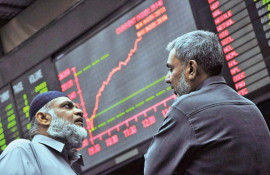
Amid the worsening power sector situation, the federal government on Wednesday approved an increase of 20% in electricity prices for export-oriented sectors and also decided not to retire Rs31 billion worth of loans that had been taken to partially pay off circular debt.
The Economic Coordination Committee (ECC) of the cabinet took these decisions as the power sector’s circular debt increased to Rs2.15 trillion by the end of June this year.
As compared to the addition of Rs38 billion per month to the circular debt at the end of Pakistan Muslim League-Nawaz’s (PML-N) tenure, the Pakistan Tehreek-e-Insaf (PTI) government has been lately adding Rs45 billion a month to the crippling debt.
“The ECC decided that the Finance Division will continue with the existing guarantee of Rs31 billion for the power sector through Power Holding Limited (PHL),” said a statement issued by the finance ministry after the meeting.
The Rs31-billion loan had been obtained three years ago to pay some of the circular debt. On maturity, the federal government could not retire the loan and decided to extend it further for three years in return for paying interest at Karachi Interbank Offered Rate (Kibor) plus 2.3%.
The cumulative interest rate at the existing State Bank of Pakistan’s (SBP) rate will be around 10%.
The loans obtained from banks to retire circular debt and parked in the government-owned PHL have increased to a whopping Rs1.01 trillion. This is in addition to the Rs1.15 trillion in circular debt that is affecting the balance sheets of energy sector’s public and private companies.
The PTI government added Rs565 billion to the circular debt in its first year in power and another Rs538 billion in the second year – an amount which was more than what the PML-N had left behind.
The government has undertaken a review of power purchase agreements and expects a relief of around Rs40 billion a year till the maturity of these agreements. It also plans to either withdraw or limit the subsidies after Prime Minister Imran Khan gave directives that only targeted subsidies be given while keeping in mind the fiscal space.
Power tariffs
The ECC approved an increase of 20%, or 1.5 US cents per unit, in electricity rates for the export-oriented sectors with effect from September, according to the decision.
“For July-August 2020, electricity to the export-oriented sectors may be provided at 7.5 US cents per kilowatt-hour (kWh) and thereafter at 9 US cents per kWh for the rest of the financial year 2020-21,” said the Ministry of Finance.
The decision will help the government restrict subsidies to Rs20 billion this year but it will put an additional burden of nearly Rs18 billion on the export-oriented sectors.
In rupee terms, the export-oriented sectors will pay a cost of Rs15 per unit – up from Rs12.5 per unit. But it will still be lower than the rate of Rs19.82 per unit for other industries.
The revised rates will be double the electricity prices in India, which will either hit the profits of exporters or they will be edged out by regional competitors in the international market.
Electricity charges in Bangladesh and India are nearly 7-9 cents per kWh while in China, which is Pakistan’s major trading partner, the electricity charges are less than 9 cents per kWh.
Exports have been struggling for the past many years. In the first two months of the current fiscal year, exports further fell 4.2%, according to the Pakistan Bureau of Statistics.
The government had announced an all-inclusive tariff of 7.5 US cents per unit for five major export sectors on January 1, 2019 to enhance Pakistan’s export competitiveness.
Spectrum auction
For the release of the next-generation mobile services (NGMS) spectrum in Pakistan for the improvement of mobile broadband services, the ECC approved the formation of an advisory committee for the release of the unsold spectrum.
However, it decided to exclude the National Accountability Bureau (NAB) from the advisory committee.
The composition of the committee is as follows: adviser to prime minister on finance & revenue (chairman), federal minister for information technology and telecommunication, an adviser to PM on Commerce, minister for industries and production, federal minister for planning, besides other members, said the finance ministry.
Terms of reference (ToRs) of the committee would be to examine and evaluate the market assessment report and recommendations of the Pakistan Telecommunication Authority (PTA) for the release of the maximum NGMS spectrum in Pakistan.
ToRs also include examining and finalising policy directives for the federal government for the release of NGMS spectrum and overseeing the release process to be conducted by PTA.
At present, the unsold spectrum in the 1,800 and 2,100 MHz bands is readily available for release through an auction.
In a meeting held at the Prime Minister’s House on July 28, 2020, the premier gave a directive for making available additional spectrum for mobile services.




1732256278-0/ellen-(1)1732256278-0-165x106.webp)
1725877703-0/Tribune-Pic-(5)1725877703-0-165x106.webp)












COMMENTS
Comments are moderated and generally will be posted if they are on-topic and not abusive.
For more information, please see our Comments FAQ